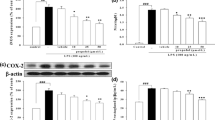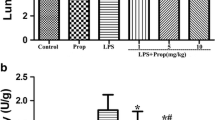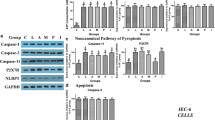Abstract.
Background
Propofol has been widely used in intravenous anesthesia. It possesses antioxidant and immunomodulating effects. This study aimed to investigate whether propofol may attenuate lipopolysaccharide (LPS)-induced endothelial cell barrier dysfunction and the possible mechanisms of such modulation.
Methods
Cultured human umbilical vein endothelial cells (HUVECs) were used to assess the following treatments: (i) no additives (negative control), (ii) LPS alone (1 and 10 μg/ml), (iii) propofol alone (20 μg/ml), (iv) intralipid (a solvent of propofol) alone (20 μg/ml), (v) LPS (10 μg/ml) combination with propofol (4 and 20 μg/ml) and (vi) LPS (10 μg/ml) combination with intralipid (20 μg/ml). Changes of cell permeability and filamentous actin (F-actin) were determined. Expression of nitrotyrosine proteins and activity of nuclear factor κB (NF-κB) were analyzed by Western blot and immunocytochemistry. Expression of endothelial nitric-oxide synthase (eNOS) and inducible nitric-oxide synthase (iNOS) were analyzed by reverse transcriptase-polymerase chain reaction.
Results
LPS markedly increased the permeability of endothelial cells, the formation of peroxynitrite and depolymerization of F-actin in HUVECs. LPS also significantly increased mRNA of iNOS, protein level of NF-κB and decreased mRNA of eNOS (P < 0.05). Propofol at both concentrations (4 and 20 μg/ml) significantly inhibited the LPS–induced increase in cell permeability and alteration in F-actin organization. Propofol also reduced the LPS-enhanced iNOS mRNA and NF-κB protein levels whilst it increased eNOS mRNA expression (P < 0.05).
Conclusion
This study demonstrated that propofol, both at therapeutic concentrations and 5 times therapeutic concentrations, inhibited NF-κB activation in LPS-stimulated endothelial cells and was found to protect endothelial cells against LPS-induced barrier dysfunction.
Similar content being viewed by others
Author information
Authors and Affiliations
Corresponding author
Additional information
Received 13 August 2005; returned for revision 30 December 2005; returned for final revision 28 March 2006; accepted by M. Katori 4 April 2006
This project was supported in part by a grant from the Natural Science Foundation of Guangdong Province (2005-259); in part by a grant from the Guangdong Province administration of TCM (2050069). Other funds come from departmental sources.
Rights and permissions
About this article
Cite this article
Gao, J., Zhao, W.X., Zhou, L.J. et al. Protective effects of propofol on lipopolysaccharide-activated endothelial cell barrier dysfunction. Inflamm. res. 55, 385–392 (2006). https://doi.org/10.1007/s00011-006-5116-0
Issue Date:
DOI: https://doi.org/10.1007/s00011-006-5116-0




